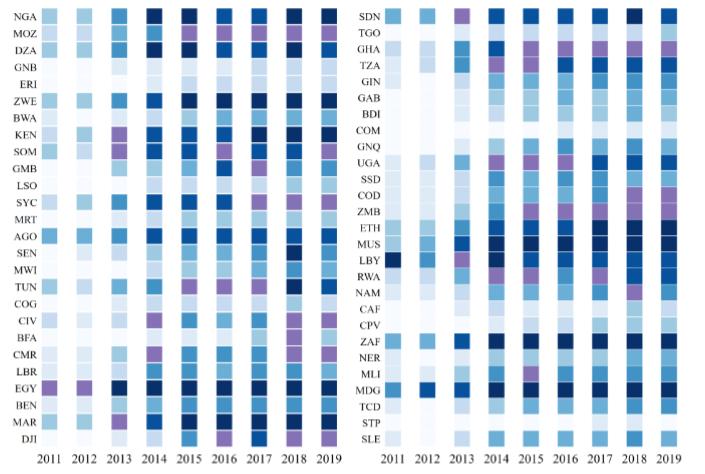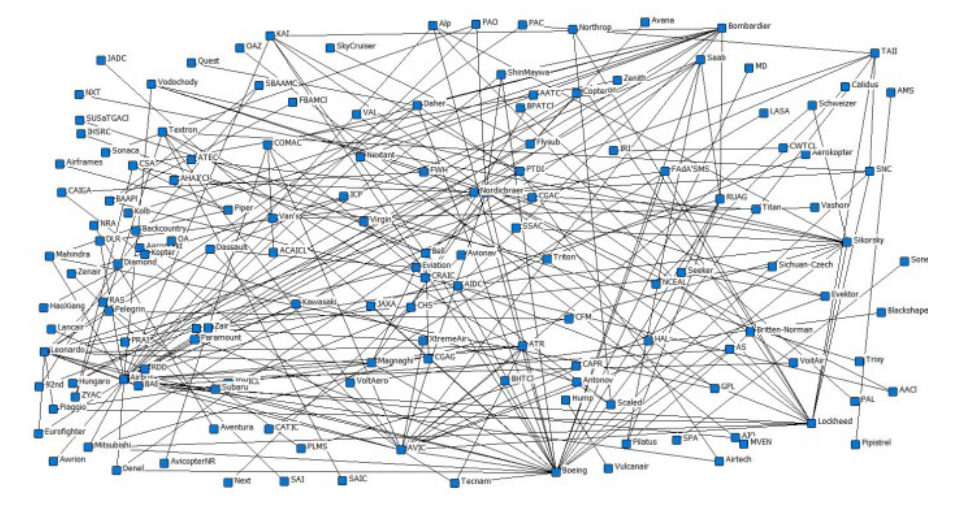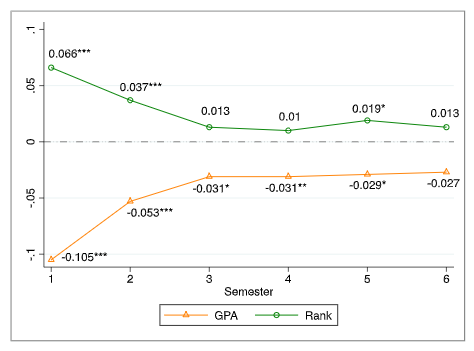Public Diplomacy and Chinese OFDI: Empirical Evidence from the Africa
Abstract
Public diplomacy is a significant factor in promoting policy communication, people-to-people bonds, and the protection of foreign assets between two nations, but there is little research on the economic worth of public diplomacy. Python was used to crawl the daily search frequency of "China", "African countries", and related terms to construct the heat index of China-Africa public diplomacy during 2011-2019, and a two-way fixed effect model was developed to examine the impact of public diplomacy on China’s outward foreign direct investment (OFDI) in Africa. The empirical results show that public diplomacy has a considerable favorable effect on China’s OFDI in Africa, and after a series of robustness tests, the basic conclusion still holds. Heterogeneity tests show the investment promotion effect of public diplomacy is more pronounced in sub-Saharan Africa and that the promotion mechanism exhibits the characteristics of poverty alleviation and risk aversion. In addition, the promotion effect of public diplomacy on China’s OFDI becomes greater as time goes on. In terms of impact mechanisms, public diplomacy may promote OFDI by enhancing financing capacity and improving national governance. The research conclusion has policy implications for promoting China-Africa public diplomacy and investment cooperation in the new era.
Cite This Paper
Ye, X., Wu, Z., Gu, S., & Zhao, S. (2023). Public Diplomacy and Chinese OFDI: Empirical Evidence from the Africa. Review of Economic Assessment, 2(1), 9. doi:10.58567/rea02010004
Ye, X.; Wu, Z.; Gu, S.; Zhao, S. Public Diplomacy and Chinese OFDI: Empirical Evidence from the Africa. Review of Economic Assessment, 2023, 2, 9. doi:10.58567/rea02010004
Ye X, Wu Z, Gu S et al.. Public Diplomacy and Chinese OFDI: Empirical Evidence from the Africa. Review of Economic Assessment; 2023, 2(1):9. doi:10.58567/rea02010004
Ye, Xinjian; Wu, Zhuolin; Gu, Shuocong; Zhao, Shikuan 2023. "Public Diplomacy and Chinese OFDI: Empirical Evidence from the Africa" Review of Economic Assessment 2, no.1:9. doi:10.58567/rea02010004
Show Figures
Share and Cite
Article Metrics
References
- Alhassan, A., & Kilishi, A. A. (2019). Weak economic institutions in Africa: a destiny or design?. International Journal of Social Economics, 46(7), 904-919. https://doi.org/10.1108/IJSE-12-2018-0651
- Anyanwu, J.C. (2012). Why Does Foreign Direct Investment Go Where It Goes?: New Evidence From African Countries. Society for AEF.
- Buch, C. M., Kesternich, I., Lipponer, A., & Schnitzer, M. (2014). Financial constraints and foreign direct investment: firm-level evidence. Review of World Economics, 150(2),393-420. https://doi.org/10.1007/s10290-013-0184-z
- Buckley,P. J.,Clegg,L. J.,Cross,A. R., Liu,X.,Voss,H.,&Zheng,P. (2007). The Determinants of Chinese Outward Foreign Direct Investment. Journal of International Business Studies, 38(4),499-518.https://doi.org/10.1057/jibs.2008.102
- Chen, Y., Zhai, R & Zhang, K.H. (2020). Natural Resources and Foreign Direct Investment in Africa: Evidence from Chinese Firms. Sustainability, 12. https://doi.org/10.3390/su12229616
- Cheng,T., Sun,H.,Zeng,X.,He,W.,Long,X. (2018).China-Africa Relations and Public Diplomacy, Public Diplomacy Quarterly (3): 81-87+130. (in Chinese) https://doi.org/10.16869/j.cnki.pdq.2018.03.014
- Darko, C., Occhiali, G & Vanino, E. (2021). The Chinese are Here: Import Penetration and Firm Productivity in Sub-Saharan Africa. Journal of Development Studies. https://doi.org/10.1080/00220388.2021.1956468
- Donaldson, D., & Storeygard,A. (2016). The View from Above: Applications of Satellite Data in Economics[J/OL]. Journal of Economic Perspectives, 30(4): 171-198. https://doi.org/10.1257/jep.30.4.171
- Feng,K., Li,R.,Chen,M. (2022).Research on the Dynamic Relationship Between China’s Aid to Africa and the Economic Growth of Africa Countries,China Economic Quarterly22(01),175-196. (in Chinese) https://doi.org/10.13821/j.cnki.ceq.2022.01.09
- Flores-Macías, GA & Kreps,S.E. (2013).The Foreign Policy Consequences of China’s Economic Rise: A Study of China’s Commercial Relations With Africa and Latin America, 1992-2006. Journal of Politics, 75(2):357-371. https://doi.org/10.1017/S0022381613000066
- Gilboa,E. (2008). Searching for a theory of public diplomacy. Annals of the American Academy of Political and Social Science, 616(1), 55-77. https://doi.org/10.1177/0002716207312142
- Gregory,B. (2008). Public diplomacy: Sunrise of an academic field. The ANNALS of the American Academy of Political and Social Science, 616(1), 274–290. https://doi.org/10.1177/0002716207311723
- Creuse,H., & Lejour,A. (2013). Market Entry and Economic Diplomacy. Applied Economics Letters,20(5),504-507. https://doi.org/10.1080/13504851.2012.714066
- Helpman, E., Melitz, M & Rubinstein,Y. (2008). Estimating trade flows: Trading partners and trading volumes. The quarterly journal of economics, 123(2):441-487. https://doi.org/10.1162/qjec.2008.123.2.441
- Huang, Y. X., & Yang, Y. (2023). Determinants of Chinese energy OFDI location decisions and entry failure risk: The roles of public diplomacy endeavors and firm investment strategies. Energy, 267. https://doi.org/10.1016/j.energy.2022.126570
- Blechman, B. M. (2004). Soft power: The means to success in world politics. Political Science Quarterly, 119(3),680-681. https://doi.org/10.1002/j.1538-165X.2004.tb01291.x
- Isaksson, A. S., & Kotsadam, A. (2018). Chinese Aid and Local Corruption. Journal of Public Economics,146-159. https://doi.org/10.1016/j.jpubeco.2018.01.002
- Jensen, N. M. (2003). Democratic Governance and Multinational Corporations: Political Regimes and Inflows of Foreign Direct Investment.International Organization ,57 (3),587–616. https://doi.org/10.1017/S0020818303573040
- Julio, B., & Yook, Y. (2012). Political Uncertainty and Corporate Investment Cycles. Journal of Finance, 67(1),45-84. https://doi.org/10.1111/j.1540-6261.2011.01707.x
- Kolstad,I. & Wiig,A. (2012). What Determines Chinese Outward FDI?.Journal of World Business,47 (1) ,26-34.https://doi.org/10.1016/j.jwb.2010.10.017
- Kurlantzick, J. (2007).Charm offensive: How China’s soft power is transforming the world. NewHaven, CT: Yale University Press.
- Manyuchi, A. E., & Mugabe, J.O. (2017) Public Policies and Institutions Influencing South Africa’s Outward Foreign Direct Investment. Politikon, 1-15. https://doi.org/10.1080/02589346.2017.1397338
- Mlambo, C. (2022). China in Africa: An Examination of the Impact of China’s Loans on Growth in Selected African States. Economies, 10(7). https://doi.org/10.3390/economies10070154
- Niu,Q., Zhong,X. (2015). A Bibliometric Analysis of the Researches on China’s Public Diplomacy. Contemporary International Relations 305(03): 56-62+31+64. (in Chinese)
- Qu,X. (2010). The Classic Meaning of Public Diplomacy and Its Chinese Characteristics, International Studies (06),4-9+70-71. (in Chinese) https://doi.org/10.3969/j.issn.0452-8832.2010.06.002
- Ramasamy,B., Yeung,M. & Laforet,S. (2012). China’s Outward Foreign Direct Investment: Location Choice and Firm Ownership. Journal of World Business, 47(1) ,17-25.https://doi.org/10.1016/j.jwb.2010.10.016
- Tan,Z. (2022). China-africa Public Diplomacy in the Age of Social Media. Contemporary World 489(8),40-43. (in Chinese)
- Nitsch,V. (2007). State Visits and International Trade. World Economy, 30(12), 1797-1816. https://doi.org/10.1111/j.1467-9701.2007.01062.x
- Wang, C., Hong, J.J., Kafouros, M., & Boateng, A. (2012). What drives outward FDI of Chinese firms? Testing the explanatory power of three theoretical frameworks. International Business Review, 21(3): 425-438. https://doi.org/10.1016/j.ibusrev.2011.05.004
- Wang,L. (2018). Public Diplomacy: A Study of Multiple Theories and Public Opinion Strategy. Theory Study. (in Chinese)
- Wang,Z. (2023). Promoting People-to-People Exchanges between China and Japan through "Media Diplomacy"—The Practice and Enlightenment of "People’s China". International Communications 316(1),35-39. (in Chinese)
- Xu,Z., Zhang,Y. (2021).Lightening Up Africa:The Effect of Chinese Aid on the Economic Development in Africa,China Economic Quarterly 21(05), 1499-1520. (in Chinese) https://doi.org/10.13821/j.cnki.ceq.2021.05.01
- Yan, B., Zhang, Y., Shen, Y.Z., & Han, J. (2018). Productivity, financial constraints and outward foreign direct investment: Firm-level evidence. China Economic Review, 47,47-64. https://doi.org/10.1016/j.chieco.2017.12.006
- Yang,J. (2014). Opening up New Prospects for Public Diplomacy with Chinese Characteristics. The Truth (4),43-46. (in Chinese)
- Zhang, S. (2013). Public diplomacy and the internationalization of Chinese enterprises. Journal of Business Research,66(12), 2429-2434.
- Zhang,X., Ding,L. (2017). Explaining the Upgrading of China’s Partnership: Pivot Partners,Broker Partners and Beyond. World Economics and Politics 438(02): 54-76+157-158. (in Chinese)
- Zhang,Z. (2021). The Effect of the Concept of a Community of Shared Future for Mankind on Bilateral Diplomatic Relations, World Economics and Politics 496(12): 24-53+156. (in Chinese)
- Zhao, K. (2019). The China Model of Public Diplomacy and its Future. The Hague Journal of Diplomacy, 14(1-2),169-181. https://doi.org/10.1163/1871191X-14101033
- Zheng, H. (2011). China’s Public Diplomacy from the Perspective of New Public Diplomacy, World Economics and Politics 368(4),143-153+160. (in Chinese)


